レイの「マネー・マネージャー資本制経済と世界金融危機」ワーッキングペーパーの
粗訳であるが、今回で最後。ここには年金の話は直接は
出てこないが、同じ文脈で理解できる。要するに年金も
「脱金融化」が必要というわけだ。
**********
THE END OF MONEY MANAGER CAPITALISM?
マネー・マネージャー資本制の終わり?
Minsky always insisted that there are two essential propositions of his
“financial instability hypothesis.” The first is that there are two financing
“regimes”—one that is consistent with stability and the other that subjects
the economy to instability. The second proposition is that “stability is
destabilizing,” so that endogenous processes will tend to move a stable system
toward fragility. The current crisis is a natural outcome of these processes—an unsustainable
explosion of real estate prices, mortgage debt, and leveraged positions in
collateralized securities and derivatives in conjunction with a similarly
unsustainable explosion of commodities prices and equities. The crash was inevitable.
ミンスキーは常に、彼の「金融不安定仮説」には2つの重要な命題があると主張していた 。
一つ目は、金融「体制regimes」には二種類ある、ということだ――一つは安定と
整合的なもの、今一つは経済を不安定化させるもの。二つ目の命題は「安定は不安定化する」。つまり
内生的なプロセス自体に、システムの安定性を脆弱化させる傾向がある。現在の危機は、
こうしたプロセス――持続不可能な不動産価格の爆発的上昇、モーゲージ債の爆発的増加や、
同じく持続不可能な商品価格の爆発的急上昇や株式の爆発的増加を糧に担保証券やデリバティブに、
レバレッジを掛けてポジションを取る戦略の爆発的増加――の、自然な結果である。崩落は不可避であった。
Hence, the problem is money manager capitalism—the economic system characterized by
highly leveraged funds seeking maximum total returns in an environment that
systematically underprices risk. With little regulation or supervision of financial
institutions, money managers concocted increasingly esoteric and opaque financial
instruments that quickly spread around the world. Contrary to orthodox economic theory,
markets generate perverse incentives for excess risk, punishing the timid. Those
playing along are rewarded with high returns because highly leveraged funding drives up
prices for the underlying assets—whether they are dot-com stocks, Las Vegas homes, or
corn futures. Those who refuse to participate get below-average returns. As Keynes said,
those who bet against speculative excesses can find that markets can remain “irrational”
longer those who short the market can remain solvent (which is the reason that
mechanisms were created to quicken the pay-outs by linking CDS bets to credit ratings
rather than to actual defaults).
従って、問題はマネー・マネージャー資本制経済――高いレバレッジを掛けられた資金がシステム的に
リスクを低く評価する環境の中で総収益の最大化を求めることによって特徴づけられる経済システム
――なのである。金融機関に対する規制や監督がほとんどない中で、マネー・マネージャー資本制は
ますます密教的で曖昧模糊とした金融商品をでっち上げ、それがあっという間に世界中に拡散した。
正統的な経済理論とは対照的に、市場は、過度のリスクに対する不条理なインセンティブを生み出し、
臆病者を罰している。この中でうまくやっている人たちは高額の報酬を受け取っている。というのは
高くレバレッジを掛けられた資金が原資産――ドット・コム株式であれ、ラスベガスの住宅であれ、
穀物の先物であれ――の価格を高く引き上げるからだ。参加を拒否する人の収益は平均以下になる。
ケインズの言うとおり、投機加熱を嫌う市場参加者たちが市場で見出すものとは、
市場というものは空売りをする人々が決済を続けることができる限り「不合理」であり続けられる、ということだ
(これが理由となって、支払いを早めるためにCDSの賭け金は、実際のデフォルトではなく
信用格付けに結びつけられたのである)。
We are now living with the aftermath as positions are delevered, driving prices of
the underlying collateral (homes, commodities, factories) down. Previous financial
crises were sufficiently limited that only a portion of managed money was wiped out,
with a new boom inevitably rising from the ashes. We remain in the midst of a commodities
and equities boom, so many are already proclaiming that the crisis is over. I think
that is premature and expect another round of financial crisis. Perhaps the next one
will be so severe that it will destroy a sufficient part of the managed money that
real reform will take place. In any case, the crisis and the scandals already revealed
have discredited the money managers. Wall Street bankers are detested and Americans are
furious about the bail-out. And, in spite of the unprecedented efforts of Fed Chairman
Bernanke and Treasury Secretary Geithner to save the money managers, I believe they will
ultimately fail to restore “business as usual.”
今や我々は、ポジションからレバレッジが除かれ、原資産(住宅、コモディティ、工場)の価格が
低下し続ける渦中に生きている。以前の金融危機ではマネー・マネージャー資金managed moneyの消滅は
一部にとどまっており、したがって新しいブームが必然的に灰から立ち昇るであろう。いまだコモディティ、
エクイティのブームが終わったわけではないのだが、多くの人がすでに危機は終わったと
宣言している。筆者には、それはまだ早すぎるし、次の金融危機がある、と考えている。おそらく、
次の危機は深刻なものとなり、マネー・マネージャー資金の大きな部分が破壊しつくされ、真の改革が
着手されることになるだろう。どの道、今回の危機と明るみにされたスキャンダルによってすでに
マネー・マネージャーたちの信用は失墜した。ウォールストリートの銀行家たちは忌み嫌われ、
アメリカ人たちはベールアウトに怒り心頭である。バーナンキ連邦議会議長やガイトナー財務長官による
マネー・マネジャー救済の努力は前例のない規模のものだが、私は最終的に「正常なビジネス[※景気?]を」
回復させることには失敗すると思っている。
The main problem is that “finance” simply became too big. At the peak it captured 40% of
all corporate profits (it recovered that share by the beginning of 2010 thanks to the
bail-out and “creative” or even fraudulent accounting), and about a fifth of value-added to
GDP. Interestingly, we find the same phenomenon in 1929, when finance received 40% of the nation’s
profits. Apparently that represents a practical maximum and thus a turning point at which
the economy collapses.
大きな問題は、「金融」が単純に巨大になりすぎたことだ。ピーク時には
全企業利潤の40%(これは、2010年初頭にはベールアウト及び「創造的」、というより
詐欺的とでもいうべき会計によって回復した)、そしてGDPの約5分の1が同部門のものとなった。興味深いことに
1929年にも同じ現象が見られ、この時も金融部門が国内利益の40%を受け取っていた。これは明らかに
事実上の最大値であり、経済が崩壊するターニングポイントでもある。
Perhaps of equal importance, finance virtually captured government,
with Wall Street alumni grabbing an unprecedented proportion of federal government
positions that have anything to do with the financial sector—including
Treasury—under three consecutive presidents (from Clinton through Obama). It is not surprising that
Wall Street gets deregulation when it wants, and that in spite of the scale of the
current financial crisis—which has wiped out an estimated $50 trillion in global wealth—there has been
no significant reform to date. Real reform might have to wait for another collapse—what I called
“round four.” When it comes, it will wipe out even more wealth, and
will bring on even more intolerable suffering. That might finally prove to be the end of this stage of
capitalism. Of course, it is too early to even speculate on the form capitalism will
take in the future.
おそらく同じ重要性を持っているのであろうが、金融が実質的に政府をとらえている。
ウォールストリートの同窓生たちがかつてない規模で連邦政府の中の、何であれ金融部門にかかわる部署に
――財務省も含む――三代に渡る大統領(クリントンからオバマ)のもと、
主要な地位にあったのである。ウォールストリートが自ら欲するタイミングで規制緩和を得ることが
出来たこと、そして今次金融危機の規模の大きさにもかかわらず――世界の財産から50兆ドルを
帳消しにした――これまでのところ重大な改革は何一つなかったこと、こうしたことには
驚くべきではない。本当の改革が行われるには次の崩壊――筆者が「第4ラウンド」と呼んだもの――を
待たねばならないのかもしれない。それが起これば財産はさらに帳消しにされるだろう。そして
さらに耐え難い苦しみに見舞われることであろう。そうなった時、この資本制経済の段階は
最終的に終わりを告げるのかもしれない。もちろん、来たるべき資本制経済の形態を予想することは
時期尚早である。
When the next crash comes, the losses must be accepted—in order to wipe out Wall Street and
the managed money. All “too big to fail” institutions should be resolved— if a bank is so big that
its failure would threaten the financial system, then it is “systemically dangerous” and
too big to save. If we had taken that approach in 2008, it would have been much easier
to actually get the economy on the road to recovery.
次の崩壊が来たとき、その損失は受け入れられなければならない――ウォールストリートと
マネー・マネージャー資金を拭い去るために。全ての「大きすぎてつぶせないtoo big to fail」金融機関は
解体されるべきである――ある銀行が単独で大きくなりすぎ、その破綻が金融システム全体を
脅かすとするなら、その銀行は「システマティックに危険systematically dangerous」なのであり、
支えるには大きすぎるのである。2008年にこのアプローチをとることが出来ていたら、
経済を回復の道へ載せることはもっとはるかに容易だったろう。
Collateral damage must be managed by directly targeting the “real” part of the economy
(households and productive firms) rather than the financial sector. We need to protect
jobs, wages, insured deposits, and retirements—but not financial institutions, including
banks or managed money. Time and economic growth can go a long way in restoring financial
health—if incomes can grow sufficiently, it becomes easier to service debt. But we will still
need debt relief for households. That should be direct, not through bail-outs of
financial institutions, taking the form of forced debt-writedowns, cash subsidies
to homeowners, or foreclosure and “rent-to-own” programs.
コラテラル・ダメージ[※軍事衝突や戦争で民間人・市民が受ける損失]は、金融部門ではなく、
直接、経済の「実物」部分(家計や生産会社)をターゲットにして回復されるのでなくてはならない。
我々には就職、賃金、保険付き預金、退職金を守る必要がある――が、金融機関、
たとえば銀行やマネー・マネージャー資金managed moneyを守る必要などない。経済成長によって
自然と金融の健全性が回復するのを待つのは、かなり時間がかかる可能性がある――所得が十分に
成長出来るなら、債務償還は容易になる。だがそれでも家計の債務救済は必要だろう。それは
直接的なものであるべきで、金融機関のベールアウトを通じた物であってはならない。つまり
強制的債務免除や住宅所有者への現金支給、あるいは現物弁財や「レント・ツー・オウン
[※購入選択権付賃貸]」プログラムなどである。
During the recovery, the private sector cannot be the main source of demand stimulus as it has
been running up debt, spending more than its income for more than a dozen years. While
the government budget deficit is growing as the economy slows, this results from deterioration of
employment and income (which lowers taxes and increases transfers)—thus it will not
proactively create growth although it will help to constrain the depths of recession. What is needed
is a massive fiscal stimulus—probably two or three times the $800 billion that
President Obama obtained—and then a permanently larger fiscal presence
to allow growth without relying on private sector debt.
回復中は、民間部門は主要な需要刺激源にはなり得ない。というのは民間部門は
過大な債務を抱えているからである。なにせ10年以上にわたり、所得を上回る支出をしてきたのである。
景気の停滞に伴い通り政府の財政赤字は成長を続けているのだが、これは雇用と所得の悪化
(これは税収を引き下げ移転支出を増やす)の結果である――従って、これでは成長を生み出すには
足らない。せいぜい不況の深刻化に歯止めをかける一助になるだけであろう。必要なのは巨額の財政刺激
――おそらく、オバマ大統領が勝ち得た8000憶ドル規模であれば2回か3回は必要であろう――と、
巨額財政支出を長期的に継続することで民間部門の債務に依存しなくても成長を可能にすることである。
More generally, we need to “definancialize” the economy—reducing the role for
Wall Street. For example, we need to replace “financialized” healthcare (run by
insurance companies that have been given a huge boost by recent legislation
labeled misleadingly as “reform”) and private pensions controlled by money managers
with universal and adequate publicly funded healthcare and retirement (Auerback and
Wray 2010; Nersisyan and Wray 2010). We need to finance higher education so that it is
less reliant on managed endowments. And we should eliminate government subsidies of
managed money—such as tax advantages and guarantees—to stop encouraging shenanigans.
より一般的な言い方をするなら、我々に必要なのは経済の
「脱金融化definanicialize」である――ウォールストリートの役割を減らすことだ。たとえば
「金融商品化されたfinancialized」ヘルスケア(近年の、誤って「改革」などと名付けられた法改正によって
大きく後押しされた保険会社によって運営されている)や、公的に社会全体から莫大な規模で調達した
ヘルスケア・退職年金を資金源としてマネー・マネージャーたちが支配している民間年金である。
(Auerback and Wray 2010; Nersisyan and Wray 2010)。我々は教育水準を引き上げるための資金を、
マネー・マネージャーたちにそれほど依存しなくて済む形で調達しなければならない。また、
マネー・マネージャーに対する政府の補助――たとえば税優遇措置や保証など――を停止し、
ペテンを奨励するようなことはやめるべきである。
Minsky (1986) argued that the Great Depression represented a failure of the
small-government/laissez-faire economic model, while the New Deal promoted a big
government/big bank (Fed) highly successful model for financial capitalism. However,
that was replaced by money manager capitalism that essentially reversed most of the
gains and that generated inequality and financial instability (Wray 2005). Minsky
insisted “the creation of new economic institutions which constrain the impact of
uncertainty is necessary,” arguing that the “aim of policy is to assure that
the economic prerequisites for sustaining the civil and civilized standards of an
open liberal society exist. If amplified uncertainty and extremes in income maldistribution
and social inequalities attenuate the economic underpinnings of democracy, then
the market behavior that creates these conditions has to be constrained” (Minsky
1996: 14, 15). We will need a new New Deal to create those new institutions
and to constrain market behavior.
ミンスキー(Minsky 1986)は、大恐慌は、小さな政府/レッセ・フェール経済モデルの失敗を表している、
と主張する。他方で、ニューディールは大きな政府/巨大銀行(Fed)は金融資本制経済の
成功モデルに掉さすものである。だが後者は、マネー・マネージャー資本制経済にとってかわられた。
これはニューディールによって得られたものをほとんどひっくり返し、格差と金融不安定性を生み出した
(Wray 2005)。ミンスキーは「不確実性のインパクトを制限する新しい経済制度の創出が必要だ」と
主張した。彼によるなら、「政策の目的とは、開かれた自由な社会という文明及び文明的基準を
持続するのに必要な経済的前提諸条件の存在を確実ならしむることである。もし不確実性が増殖し、
所得分配の悪化や社会格差が極端になった結果、民主主義の経済的基盤がやせ細ってしまうのであれば、
そうした条件を創りだしている市場の行動には制限が掛けられなければならない」
(Minsky 1996: 14, 15)。新しいニューディールによってこうした新しい制度を創りだし、そして
市場の行動に制限を課すことが必要だろう。
The global crisis offers both grave risks as well as opportunities. Global employment and
output are collapsing faster than at any time since the Great Depression. Hunger and
violence are growing—even in developed nations. The 1930s offer examples of possible responses—on the
one hand, nationalism and repression, on the other a New Deal and progressive policy.
There is no question that finance has played an outsized role over the past two decades,
both in the developed nations where policy promoted managed money and in the developing
nations which were encouraged to open to international capital.
世界的危機は、重大なリスクと機会の両方を提供している。世界の雇用と生産は大恐慌以来、
最大の速度で崩壊し続けている。飢えと暴力が――先進国においてすら――増加しつつある。
1930年代の経験は可能な対応例を示している――一方では、ナショナリズムと抑圧、他方では
ニューディールと進歩的政策。疑問の余地がないのは、金融がこの20年間にわたり桁外れの役割を
果たしてきたこと、それは政策によってマネー・マネージャー資金が後押しされてきた
先進国においても、国際資本へ開放することが奨励されてきた発展途上国においても同様である。
Households and firms in developed nations were buried under mountains of debt even as incomes for
wage earners stagnated. Developing nations were similarly swamped with external debt
service commitments, while the promised benefits of neoliberal policies usually never
arrived. It is time to finally put global finance back in its proper place as a tool
to achieving sustainable development. This means substantial downsizing and careful
re-regulation. Government must play a bigger role, which in turn requires a new
economic paradigm that recognizes the possibility of simultaneously achieving social
justice, full employment, and price and currency stability through appropriate policy.
先進国では家計と企業は、賃金所得の伸びが停滞していたときでさえ、債務の山の中に
埋められてきた。発展途上国も同様に対外債務償還のコミットメントに沈んでいったが、しかし
ネオリベラリズム政策によって約束された利益は、通常達成されることがなかった。今こそ世界金融を、
持続可能な発展を達成するためのツールとして、あるべきところへと戻すときだ。これは
大幅な小型化と慎重な再規制とが必要だ。政府はもっと大きな役割を果たすべきである。そこでは、
しかるべき政策を通じて社会正義、完全雇用、価格と通貨の安定とを同時に達成する可能性を
認識している新しい経済的パラダイムが必要となるのである。
粗訳であるが、今回で最後。ここには年金の話は直接は
出てこないが、同じ文脈で理解できる。要するに年金も
「脱金融化」が必要というわけだ。
**********
THE END OF MONEY MANAGER CAPITALISM?
マネー・マネージャー資本制の終わり?
Minsky always insisted that there are two essential propositions of his
“financial instability hypothesis.” The first is that there are two financing
“regimes”—one that is consistent with stability and the other that subjects
the economy to instability. The second proposition is that “stability is
destabilizing,” so that endogenous processes will tend to move a stable system
toward fragility. The current crisis is a natural outcome of these processes—an unsustainable
explosion of real estate prices, mortgage debt, and leveraged positions in
collateralized securities and derivatives in conjunction with a similarly
unsustainable explosion of commodities prices and equities. The crash was inevitable.
ミンスキーは常に、彼の「金融不安定仮説」には2つの重要な命題があると主張していた 。
一つ目は、金融「体制regimes」には二種類ある、ということだ――一つは安定と
整合的なもの、今一つは経済を不安定化させるもの。二つ目の命題は「安定は不安定化する」。つまり
内生的なプロセス自体に、システムの安定性を脆弱化させる傾向がある。現在の危機は、
こうしたプロセス――持続不可能な不動産価格の爆発的上昇、モーゲージ債の爆発的増加や、
同じく持続不可能な商品価格の爆発的急上昇や株式の爆発的増加を糧に担保証券やデリバティブに、
レバレッジを掛けてポジションを取る戦略の爆発的増加――の、自然な結果である。崩落は不可避であった。
Hence, the problem is money manager capitalism—the economic system characterized by
highly leveraged funds seeking maximum total returns in an environment that
systematically underprices risk. With little regulation or supervision of financial
institutions, money managers concocted increasingly esoteric and opaque financial
instruments that quickly spread around the world. Contrary to orthodox economic theory,
markets generate perverse incentives for excess risk, punishing the timid. Those
playing along are rewarded with high returns because highly leveraged funding drives up
prices for the underlying assets—whether they are dot-com stocks, Las Vegas homes, or
corn futures. Those who refuse to participate get below-average returns. As Keynes said,
those who bet against speculative excesses can find that markets can remain “irrational”
longer those who short the market can remain solvent (which is the reason that
mechanisms were created to quicken the pay-outs by linking CDS bets to credit ratings
rather than to actual defaults).
従って、問題はマネー・マネージャー資本制経済――高いレバレッジを掛けられた資金がシステム的に
リスクを低く評価する環境の中で総収益の最大化を求めることによって特徴づけられる経済システム
――なのである。金融機関に対する規制や監督がほとんどない中で、マネー・マネージャー資本制は
ますます密教的で曖昧模糊とした金融商品をでっち上げ、それがあっという間に世界中に拡散した。
正統的な経済理論とは対照的に、市場は、過度のリスクに対する不条理なインセンティブを生み出し、
臆病者を罰している。この中でうまくやっている人たちは高額の報酬を受け取っている。というのは
高くレバレッジを掛けられた資金が原資産――ドット・コム株式であれ、ラスベガスの住宅であれ、
穀物の先物であれ――の価格を高く引き上げるからだ。参加を拒否する人の収益は平均以下になる。
ケインズの言うとおり、投機加熱を嫌う市場参加者たちが市場で見出すものとは、
市場というものは空売りをする人々が決済を続けることができる限り「不合理」であり続けられる、ということだ
(これが理由となって、支払いを早めるためにCDSの賭け金は、実際のデフォルトではなく
信用格付けに結びつけられたのである)。
We are now living with the aftermath as positions are delevered, driving prices of
the underlying collateral (homes, commodities, factories) down. Previous financial
crises were sufficiently limited that only a portion of managed money was wiped out,
with a new boom inevitably rising from the ashes. We remain in the midst of a commodities
and equities boom, so many are already proclaiming that the crisis is over. I think
that is premature and expect another round of financial crisis. Perhaps the next one
will be so severe that it will destroy a sufficient part of the managed money that
real reform will take place. In any case, the crisis and the scandals already revealed
have discredited the money managers. Wall Street bankers are detested and Americans are
furious about the bail-out. And, in spite of the unprecedented efforts of Fed Chairman
Bernanke and Treasury Secretary Geithner to save the money managers, I believe they will
ultimately fail to restore “business as usual.”
今や我々は、ポジションからレバレッジが除かれ、原資産(住宅、コモディティ、工場)の価格が
低下し続ける渦中に生きている。以前の金融危機ではマネー・マネージャー資金managed moneyの消滅は
一部にとどまっており、したがって新しいブームが必然的に灰から立ち昇るであろう。いまだコモディティ、
エクイティのブームが終わったわけではないのだが、多くの人がすでに危機は終わったと
宣言している。筆者には、それはまだ早すぎるし、次の金融危機がある、と考えている。おそらく、
次の危機は深刻なものとなり、マネー・マネージャー資金の大きな部分が破壊しつくされ、真の改革が
着手されることになるだろう。どの道、今回の危機と明るみにされたスキャンダルによってすでに
マネー・マネージャーたちの信用は失墜した。ウォールストリートの銀行家たちは忌み嫌われ、
アメリカ人たちはベールアウトに怒り心頭である。バーナンキ連邦議会議長やガイトナー財務長官による
マネー・マネジャー救済の努力は前例のない規模のものだが、私は最終的に「正常なビジネス[※景気?]を」
回復させることには失敗すると思っている。
The main problem is that “finance” simply became too big. At the peak it captured 40% of
all corporate profits (it recovered that share by the beginning of 2010 thanks to the
bail-out and “creative” or even fraudulent accounting), and about a fifth of value-added to
GDP. Interestingly, we find the same phenomenon in 1929, when finance received 40% of the nation’s
profits. Apparently that represents a practical maximum and thus a turning point at which
the economy collapses.
大きな問題は、「金融」が単純に巨大になりすぎたことだ。ピーク時には
全企業利潤の40%(これは、2010年初頭にはベールアウト及び「創造的」、というより
詐欺的とでもいうべき会計によって回復した)、そしてGDPの約5分の1が同部門のものとなった。興味深いことに
1929年にも同じ現象が見られ、この時も金融部門が国内利益の40%を受け取っていた。これは明らかに
事実上の最大値であり、経済が崩壊するターニングポイントでもある。
Perhaps of equal importance, finance virtually captured government,
with Wall Street alumni grabbing an unprecedented proportion of federal government
positions that have anything to do with the financial sector—including
Treasury—under three consecutive presidents (from Clinton through Obama). It is not surprising that
Wall Street gets deregulation when it wants, and that in spite of the scale of the
current financial crisis—which has wiped out an estimated $50 trillion in global wealth—there has been
no significant reform to date. Real reform might have to wait for another collapse—what I called
“round four.” When it comes, it will wipe out even more wealth, and
will bring on even more intolerable suffering. That might finally prove to be the end of this stage of
capitalism. Of course, it is too early to even speculate on the form capitalism will
take in the future.
おそらく同じ重要性を持っているのであろうが、金融が実質的に政府をとらえている。
ウォールストリートの同窓生たちがかつてない規模で連邦政府の中の、何であれ金融部門にかかわる部署に
――財務省も含む――三代に渡る大統領(クリントンからオバマ)のもと、
主要な地位にあったのである。ウォールストリートが自ら欲するタイミングで規制緩和を得ることが
出来たこと、そして今次金融危機の規模の大きさにもかかわらず――世界の財産から50兆ドルを
帳消しにした――これまでのところ重大な改革は何一つなかったこと、こうしたことには
驚くべきではない。本当の改革が行われるには次の崩壊――筆者が「第4ラウンド」と呼んだもの――を
待たねばならないのかもしれない。それが起これば財産はさらに帳消しにされるだろう。そして
さらに耐え難い苦しみに見舞われることであろう。そうなった時、この資本制経済の段階は
最終的に終わりを告げるのかもしれない。もちろん、来たるべき資本制経済の形態を予想することは
時期尚早である。
When the next crash comes, the losses must be accepted—in order to wipe out Wall Street and
the managed money. All “too big to fail” institutions should be resolved— if a bank is so big that
its failure would threaten the financial system, then it is “systemically dangerous” and
too big to save. If we had taken that approach in 2008, it would have been much easier
to actually get the economy on the road to recovery.
次の崩壊が来たとき、その損失は受け入れられなければならない――ウォールストリートと
マネー・マネージャー資金を拭い去るために。全ての「大きすぎてつぶせないtoo big to fail」金融機関は
解体されるべきである――ある銀行が単独で大きくなりすぎ、その破綻が金融システム全体を
脅かすとするなら、その銀行は「システマティックに危険systematically dangerous」なのであり、
支えるには大きすぎるのである。2008年にこのアプローチをとることが出来ていたら、
経済を回復の道へ載せることはもっとはるかに容易だったろう。
Collateral damage must be managed by directly targeting the “real” part of the economy
(households and productive firms) rather than the financial sector. We need to protect
jobs, wages, insured deposits, and retirements—but not financial institutions, including
banks or managed money. Time and economic growth can go a long way in restoring financial
health—if incomes can grow sufficiently, it becomes easier to service debt. But we will still
need debt relief for households. That should be direct, not through bail-outs of
financial institutions, taking the form of forced debt-writedowns, cash subsidies
to homeowners, or foreclosure and “rent-to-own” programs.
コラテラル・ダメージ[※軍事衝突や戦争で民間人・市民が受ける損失]は、金融部門ではなく、
直接、経済の「実物」部分(家計や生産会社)をターゲットにして回復されるのでなくてはならない。
我々には就職、賃金、保険付き預金、退職金を守る必要がある――が、金融機関、
たとえば銀行やマネー・マネージャー資金managed moneyを守る必要などない。経済成長によって
自然と金融の健全性が回復するのを待つのは、かなり時間がかかる可能性がある――所得が十分に
成長出来るなら、債務償還は容易になる。だがそれでも家計の債務救済は必要だろう。それは
直接的なものであるべきで、金融機関のベールアウトを通じた物であってはならない。つまり
強制的債務免除や住宅所有者への現金支給、あるいは現物弁財や「レント・ツー・オウン
[※購入選択権付賃貸]」プログラムなどである。
During the recovery, the private sector cannot be the main source of demand stimulus as it has
been running up debt, spending more than its income for more than a dozen years. While
the government budget deficit is growing as the economy slows, this results from deterioration of
employment and income (which lowers taxes and increases transfers)—thus it will not
proactively create growth although it will help to constrain the depths of recession. What is needed
is a massive fiscal stimulus—probably two or three times the $800 billion that
President Obama obtained—and then a permanently larger fiscal presence
to allow growth without relying on private sector debt.
回復中は、民間部門は主要な需要刺激源にはなり得ない。というのは民間部門は
過大な債務を抱えているからである。なにせ10年以上にわたり、所得を上回る支出をしてきたのである。
景気の停滞に伴い通り政府の財政赤字は成長を続けているのだが、これは雇用と所得の悪化
(これは税収を引き下げ移転支出を増やす)の結果である――従って、これでは成長を生み出すには
足らない。せいぜい不況の深刻化に歯止めをかける一助になるだけであろう。必要なのは巨額の財政刺激
――おそらく、オバマ大統領が勝ち得た8000憶ドル規模であれば2回か3回は必要であろう――と、
巨額財政支出を長期的に継続することで民間部門の債務に依存しなくても成長を可能にすることである。
More generally, we need to “definancialize” the economy—reducing the role for
Wall Street. For example, we need to replace “financialized” healthcare (run by
insurance companies that have been given a huge boost by recent legislation
labeled misleadingly as “reform”) and private pensions controlled by money managers
with universal and adequate publicly funded healthcare and retirement (Auerback and
Wray 2010; Nersisyan and Wray 2010). We need to finance higher education so that it is
less reliant on managed endowments. And we should eliminate government subsidies of
managed money—such as tax advantages and guarantees—to stop encouraging shenanigans.
より一般的な言い方をするなら、我々に必要なのは経済の
「脱金融化definanicialize」である――ウォールストリートの役割を減らすことだ。たとえば
「金融商品化されたfinancialized」ヘルスケア(近年の、誤って「改革」などと名付けられた法改正によって
大きく後押しされた保険会社によって運営されている)や、公的に社会全体から莫大な規模で調達した
ヘルスケア・退職年金を資金源としてマネー・マネージャーたちが支配している民間年金である。
(Auerback and Wray 2010; Nersisyan and Wray 2010)。我々は教育水準を引き上げるための資金を、
マネー・マネージャーたちにそれほど依存しなくて済む形で調達しなければならない。また、
マネー・マネージャーに対する政府の補助――たとえば税優遇措置や保証など――を停止し、
ペテンを奨励するようなことはやめるべきである。
Minsky (1986) argued that the Great Depression represented a failure of the
small-government/laissez-faire economic model, while the New Deal promoted a big
government/big bank (Fed) highly successful model for financial capitalism. However,
that was replaced by money manager capitalism that essentially reversed most of the
gains and that generated inequality and financial instability (Wray 2005). Minsky
insisted “the creation of new economic institutions which constrain the impact of
uncertainty is necessary,” arguing that the “aim of policy is to assure that
the economic prerequisites for sustaining the civil and civilized standards of an
open liberal society exist. If amplified uncertainty and extremes in income maldistribution
and social inequalities attenuate the economic underpinnings of democracy, then
the market behavior that creates these conditions has to be constrained” (Minsky
1996: 14, 15). We will need a new New Deal to create those new institutions
and to constrain market behavior.
ミンスキー(Minsky 1986)は、大恐慌は、小さな政府/レッセ・フェール経済モデルの失敗を表している、
と主張する。他方で、ニューディールは大きな政府/巨大銀行(Fed)は金融資本制経済の
成功モデルに掉さすものである。だが後者は、マネー・マネージャー資本制経済にとってかわられた。
これはニューディールによって得られたものをほとんどひっくり返し、格差と金融不安定性を生み出した
(Wray 2005)。ミンスキーは「不確実性のインパクトを制限する新しい経済制度の創出が必要だ」と
主張した。彼によるなら、「政策の目的とは、開かれた自由な社会という文明及び文明的基準を
持続するのに必要な経済的前提諸条件の存在を確実ならしむることである。もし不確実性が増殖し、
所得分配の悪化や社会格差が極端になった結果、民主主義の経済的基盤がやせ細ってしまうのであれば、
そうした条件を創りだしている市場の行動には制限が掛けられなければならない」
(Minsky 1996: 14, 15)。新しいニューディールによってこうした新しい制度を創りだし、そして
市場の行動に制限を課すことが必要だろう。
The global crisis offers both grave risks as well as opportunities. Global employment and
output are collapsing faster than at any time since the Great Depression. Hunger and
violence are growing—even in developed nations. The 1930s offer examples of possible responses—on the
one hand, nationalism and repression, on the other a New Deal and progressive policy.
There is no question that finance has played an outsized role over the past two decades,
both in the developed nations where policy promoted managed money and in the developing
nations which were encouraged to open to international capital.
世界的危機は、重大なリスクと機会の両方を提供している。世界の雇用と生産は大恐慌以来、
最大の速度で崩壊し続けている。飢えと暴力が――先進国においてすら――増加しつつある。
1930年代の経験は可能な対応例を示している――一方では、ナショナリズムと抑圧、他方では
ニューディールと進歩的政策。疑問の余地がないのは、金融がこの20年間にわたり桁外れの役割を
果たしてきたこと、それは政策によってマネー・マネージャー資金が後押しされてきた
先進国においても、国際資本へ開放することが奨励されてきた発展途上国においても同様である。
Households and firms in developed nations were buried under mountains of debt even as incomes for
wage earners stagnated. Developing nations were similarly swamped with external debt
service commitments, while the promised benefits of neoliberal policies usually never
arrived. It is time to finally put global finance back in its proper place as a tool
to achieving sustainable development. This means substantial downsizing and careful
re-regulation. Government must play a bigger role, which in turn requires a new
economic paradigm that recognizes the possibility of simultaneously achieving social
justice, full employment, and price and currency stability through appropriate policy.
先進国では家計と企業は、賃金所得の伸びが停滞していたときでさえ、債務の山の中に
埋められてきた。発展途上国も同様に対外債務償還のコミットメントに沈んでいったが、しかし
ネオリベラリズム政策によって約束された利益は、通常達成されることがなかった。今こそ世界金融を、
持続可能な発展を達成するためのツールとして、あるべきところへと戻すときだ。これは
大幅な小型化と慎重な再規制とが必要だ。政府はもっと大きな役割を果たすべきである。そこでは、
しかるべき政策を通じて社会正義、完全雇用、価格と通貨の安定とを同時に達成する可能性を
認識している新しい経済的パラダイムが必要となるのである。










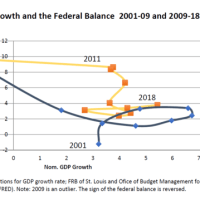
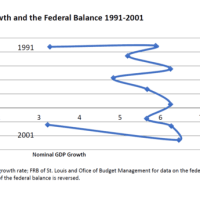
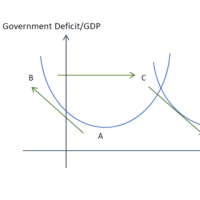
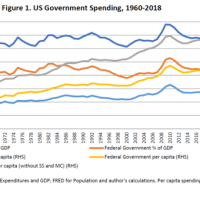
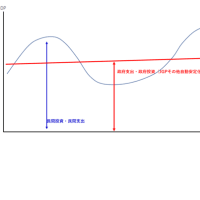
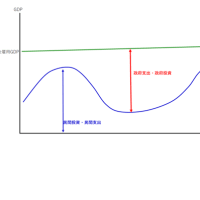
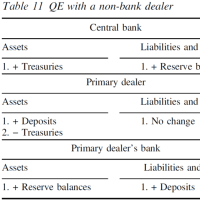
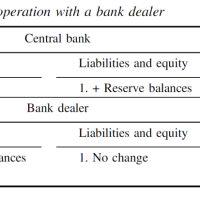
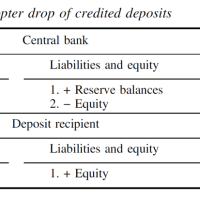
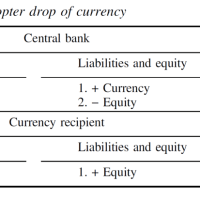
※コメント投稿者のブログIDはブログ作成者のみに通知されます